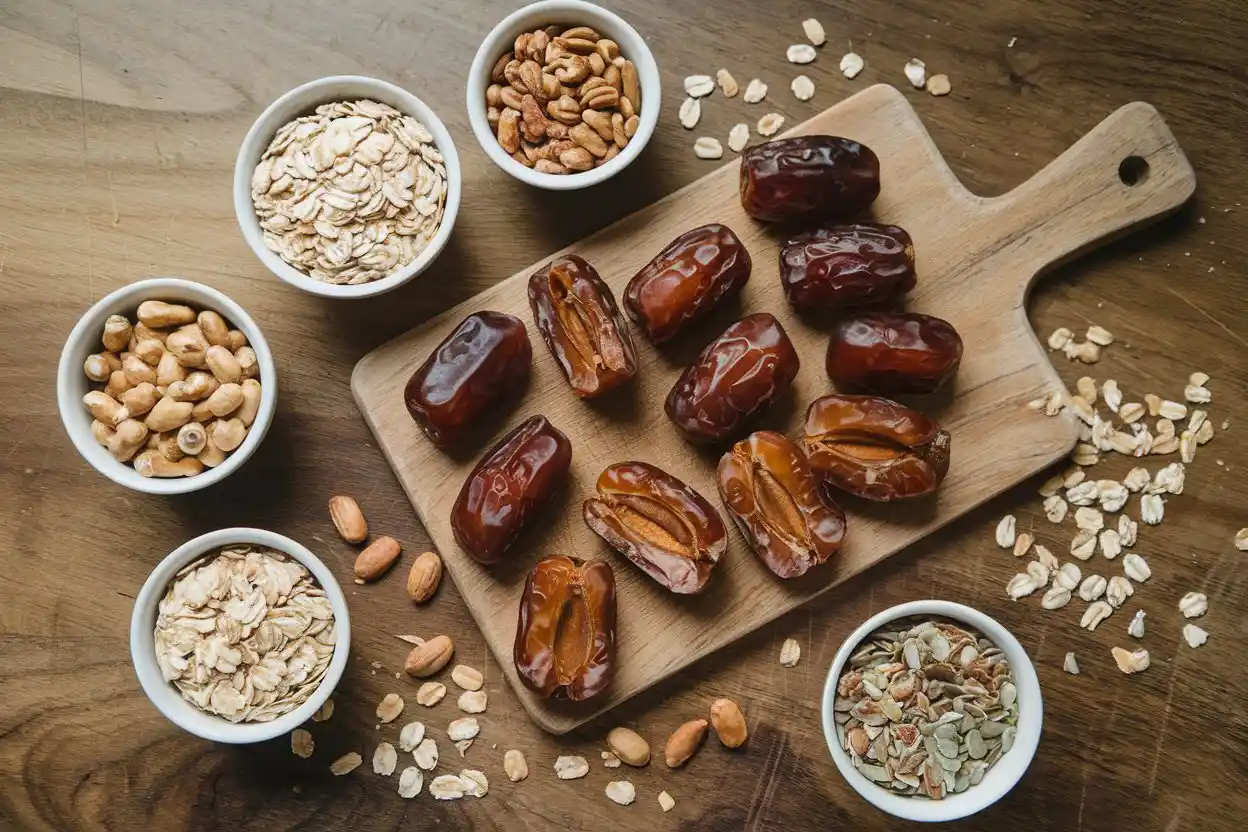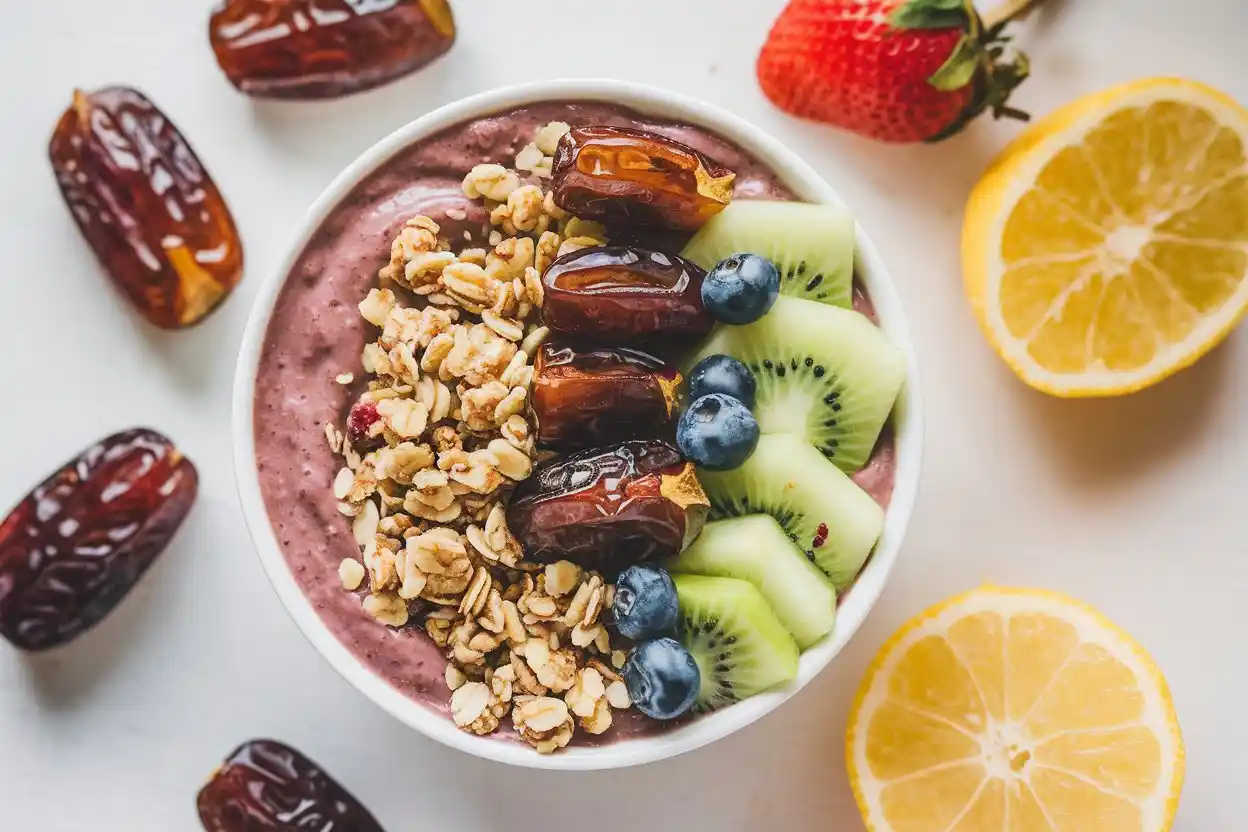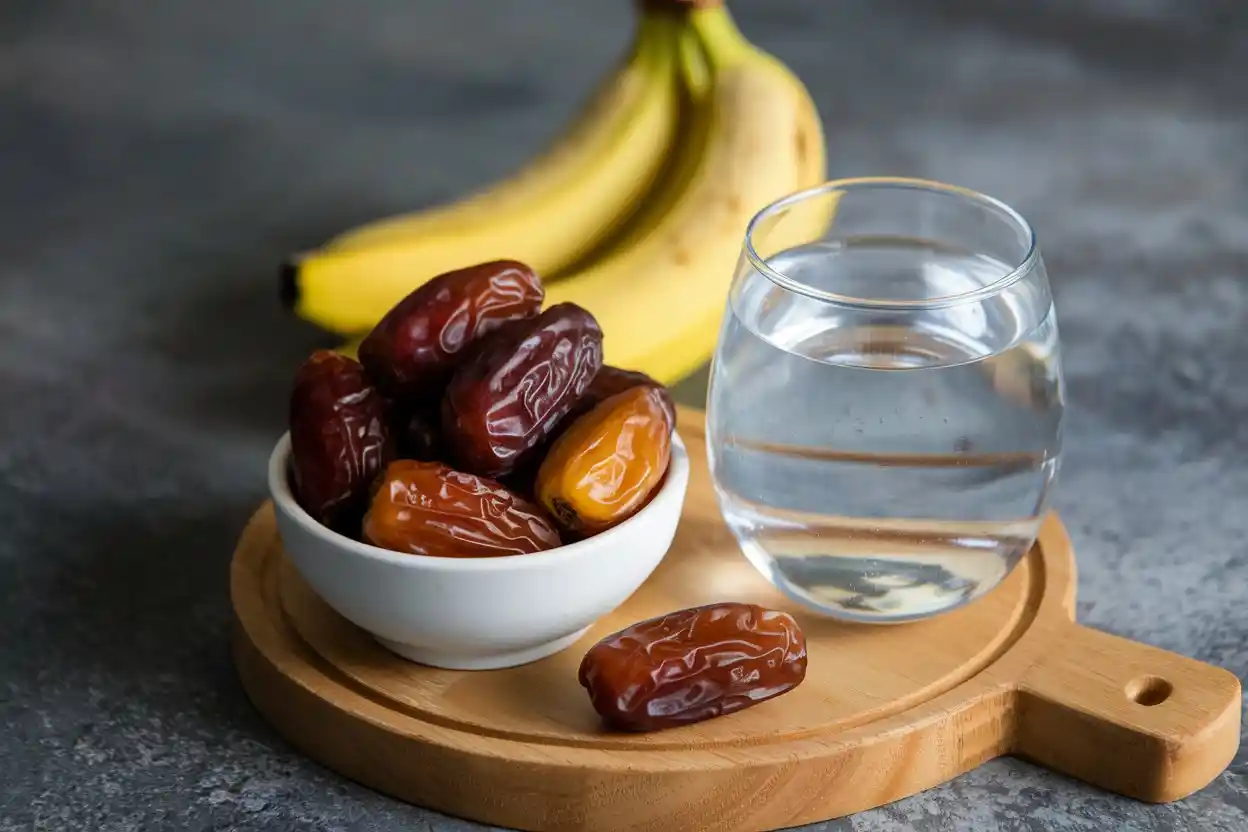Small but mighty! Dates are nature’s candy—sweet, nutritious, and packed with benefits for your body. Whether you enjoy them as a snack, in smoothies, or as a natural sweetener in desserts, date palm fruit is a delicious way to fuel your body with essential nutrients.
For centuries, dates have been a staple in Middle Eastern and Mediterranean diets. They’re not just a tasty treat; they’re packed with fiber, antioxidants, and vital minerals that support overall health. From boosting digestion to enhancing heart health, let’s explore why dates deserve a spot in your daily diet.
Why You’ll Love Dates
Dates are more than just a sweet indulgence—they are a nutrient powerhouse! Here’s why they should be part of your diet:
- Aid digestion – High fiber content promotes gut health and prevents constipation.
- Provide natural energy – Their natural sugars offer a quick and sustained energy boost.
- Support heart health – Rich in potassium and magnesium, they help regulate blood pressure.
- Help with hormonal balance & pregnancy health – A natural source of iron and essential nutrients for women’s well-being.
- Delicious & versatile! – Perfect for smoothies, snacks, and baked goods.
Nutritional Snapshot of Dates
One serving (about 2–3 Medjool dates) contains:
- Calories: ~150
- Carbohydrates: ~40g (natural sugars and fiber)
- Fiber: ~3–4g (supports digestion)
- Potassium: ~280mg (heart and muscle function)
- Magnesium: ~15mg (bone and nerve health)
- Iron: ~0.3mg (important for red blood cells)
- Antioxidants: Flavonoids, carotenoids, and phenolic acid (reduce inflammation and support immunity)
These tiny fruits are nutrient-dense and naturally sweet, making them an excellent alternative to processed sugars while offering numerous health benefits.
How Dates Benefit Your Body
- Improve Digestive Health – The fiber in dates promotes gut health by feeding beneficial bacteria and preventing constipation.
- Boost Energy Levels – Natural sugars provide sustained energy without the crash.
- Support Heart Health – Potassium and magnesium help regulate blood pressure and prevent cardiovascular diseases.
- Enhance Brain Function – Antioxidants in dates protect brain cells and may improve memory.
- Aid in Pregnancy & Postpartum Recovery – Nutrients in dates help with labor preparation and postpartum healing.
With so many benefits, it’s easy to see why dates have been a cherished superfood for centuries. Whether you’re looking to improve digestion, maintain heart health, or simply enjoy a tasty natural treat, dates are a fantastic choice!

What Are the Benefits of Eating Date Palm?
Nutrient Breakdown of Dates
Dates are packed with essential nutrients that contribute to overall well-being. Here’s a closer look at their key components:
- Fiber – Promotes digestion, prevents constipation, and supports gut health.
- Potassium & Magnesium – Crucial for heart health, muscle function, and blood pressure regulation.
- Iron – Aids in preventing anemia and maintaining energy levels, especially for women.
- Antioxidants (Flavonoids, Carotenoids, Phenolic Acid) – Combat inflammation and strengthen the immune system.
Top Health Benefits of Dates
- Boosts Energy Naturally – Their natural sugars (glucose, fructose, and sucrose) provide quick energy, making them a great pre- or post-workout snack.
- Aids Digestion & Gut Health – The high fiber content promotes bowel regularity and supports a healthy microbiome.
- Supports Heart Health – Helps lower blood pressure and improve circulation by reducing LDL (bad) cholesterol levels.
- Improves Brain Function – Studies suggest that dates may enhance cognitive function and protect against neurodegenerative diseases.
- Promotes Bone Health – Magnesium and calcium contribute to bone strength and density.
Dates are an incredibly versatile superfood that can support multiple aspects of your health. Whether enjoyed on their own or incorporated into meals, they offer a natural way to nourish your body.
What Does Date Palm Do in a Woman’s Body?
Hormonal Balance & Iron Support
Women’s bodies have unique nutritional needs, and dates can play a crucial role in supporting hormonal health. The iron content in dates helps prevent anemia, a common concern during menstruation, pregnancy, and postpartum recovery. Additionally, the B vitamins and antioxidants in dates help regulate hormones, reducing symptoms like fatigue and mood swings.
Pregnancy & Labor Benefits
Dates have been traditionally used to aid in pregnancy and labor. Also studies suggest that consuming dates in the final weeks of pregnancy may help:
- Soften the cervix and promote natural labor.
- Shorten labor duration by increasing oxytocin sensitivity.
- Reduce the need for medical induction in some cases.
Postpartum & Breastfeeding Benefits
After childbirth, a woman’s body requires replenishment of essential nutrients. Dates provide natural energy, iron, and fiber, which help with postpartum recovery. Additionally, they are believed to support lactation by boosting milk production.
Incorporating dates into a balanced diet can provide women with essential nutrients to support their well-being through various life stages.
How Do Dates Affect Digestion and Gut Health?
Prebiotic Fiber for Gut Health
Dates contain prebiotic fiber, which serves as food for beneficial gut bacteria. A healthy gut microbiome is essential for digestion, immunity, and even mental health. Also by consuming dates regularly, you can help maintain a balanced and thriving gut environment.
Natural Remedy for Constipation
One of the most well-known benefits of dates is their ability to relieve constipation naturally. The fiber in dates adds bulk to stool and promotes regular bowel movements. Soaking dates in water overnight and consuming them in the morning can provide a gentle laxative effect.
Helps Reduce Bloating & Indigestion
If you struggle with bloating or indigestion, dates may help. Their natural enzymes aid in breaking down food more efficiently, reducing discomfort after meals. Plus, their anti-inflammatory properties help soothe the digestive tract.
By incorporating dates into your diet, you can support a healthier digestive system and experience fewer stomach-related issues.
Use pureed dates in place of refined sugar in recipes like muffins, cookies, and cakes for a healthier twist.

Delicious Date Palm Recipe – Date & Berry Smoothie Bowl
Ingredients:
- 4 Medjool dates, pitted
- 1 frozen banana
- ½ cup mixed berries (blueberries, strawberries)
- ½ cup Greek yogurt (or plant-based alternative)
- ½ cup almond milk (or milk of choice)
- 1 tbsp chia seeds (for extra fiber and omega-3s)
- ¼ cup granola (for crunch)
- ½ kiwi, sliced (for garnish)
- 2–3 whole dates (for topping)
Instructions:
- In a blender, combine pitted dates, frozen banana, mixed berries, yogurt, and almond milk.
- Blend until smooth and creamy. So if too thick, add more almond milk.
- Pour into a bowl and top with granola, sliced kiwi, whole dates, and extra berries.
- Serve immediately and enjoy a nutrient-packed, gut-friendly meal!
Can Dates Help in Managing Blood Pressure?
Potassium & Magnesium for Cardiovascular Support
Dates are rich in potassium and magnesium, two essential minerals that help regulate blood pressure. Also potassium helps balance sodium levels in the body, preventing hypertension, while magnesium supports heart function and circulation.
Antioxidants for Artery Protection
The antioxidants in dates protect against arterial plaque buildup, reducing the risk of heart disease. These compounds also help prevent oxidative stress, which can contribute to high blood pressure.
How Many Dates Should You Eat for Heart Benefits?
To support heart health, aim to eat 2–4 dates per day as part of a balanced diet. So pairing dates with heart-healthy foods like nuts and yogurt can enhance their benefits.
Managing Sugar Intake & Diabetes Concerns
Do Dates Cause Blood Sugar Spikes?
Despite their natural sweetness, dates have a low glycemic index (GI), meaning they cause a slower rise in blood sugar compared to refined sugars. However, individuals with diabetes should still consume them in moderation.
Best Ways to Eat Dates for Blood Sugar Control
To prevent blood sugar spikes, try these strategies:
- Pair with protein or healthy fats – Eating dates with nuts, yogurt, or seeds helps slow sugar absorption.
- Limit portion sizes – Stick to 1–2 dates per serving to maintain balanced blood sugar levels.
- Choose whole dates over processed date products – Processed varieties may contain added sugars.
Portion Control Tips for Diabetics
For those managing diabetes, mindful consumption is key. A general recommendation is to eat one to two dates per serving and pair them with fiber-rich or protein-packed foods to maintain steady blood sugar levels.
By incorporating dates wisely into your diet, you can enjoy their natural sweetness without negatively impacting your health.
FAQs & Common Concerns
What are the benefits of eating date palm?
Dates are loaded with nutrients that offer a variety of health benefits. For starters, they’re an excellent source of dietary fiber, which promotes digestive health and regular bowel movements. Additionally, dates are rich in natural sugars, providing a quick and sustained energy boost.
Moreover, dates contain important vitamins and minerals, such as potassium, magnesium, and antioxidants, which support heart health, reduce inflammation, and protect against chronic diseases. As a result, eating dates regularly can contribute to overall well-being.
What does date palm do in a woman’s body?
Dates can be particularly beneficial for women. The iron content in dates helps combat anemia, especially during menstruation, while the natural sugars provide energy during hormonal fluctuations.
For pregnant women, studies suggest that consuming dates in the final weeks of pregnancy may ease labor by softening the cervix and promoting natural contractions. Furthermore, the fiber in dates helps with postpartum recovery by improving digestion and preventing constipation.
Do dates cause inflammation in the body?
Quite the opposite! Dates are known for their anti-inflammatory properties. They’re packed with antioxidants like flavonoids and phenolic acid, which combat inflammation at a cellular level. These compounds help reduce the risk of conditions such as arthritis, cardiovascular disease, and other inflammation-related issues.
That said, overconsumption of any food can lead to imbalances in the body, so it’s essential to enjoy dates in moderation to avoid unwanted effects.
How do dates affect digestion and gut health?
Dates improve digestion naturally with their high fiber content.
Dates are a gut-friendly food, thanks to their high fiber content. The fiber acts as a natural digestive aid, preventing constipation and supporting regular bowel movements. Additionally, dates contain prebiotic fiber, which feeds the beneficial bacteria in your gut.
This balance of good bacteria is crucial for maintaining a healthy digestive system and boosting overall immunity. To maximize these benefits, pair dates with plenty of water to enhance their natural fiber’s effects.
Can dates help in managing blood pressure?
Yes, dates can play a role in blood pressure management. They’re rich in potassium, a mineral that helps regulate blood pressure by balancing sodium levels in the body. Additionally, dates are low in sodium, making them a heart-friendly choice for those watching their salt intake.
The magnesium in dates also contributes to healthy blood vessel function, further supporting cardiovascular health. Including dates as part of a balanced diet can be a simple yet effective way to promote a healthy heart.
Are there any risks to eating dates every day?
While dates are nutritious, eating them in excess can lead to certain issues. For one, dates are calorie-dense, so consuming too many can contribute to weight gain, especially if you’re not mindful of portion sizes.
Additionally, the high natural sugar content in dates can cause blood sugar spikes, which might be problematic for individuals with diabetes. However, pairing dates with protein or healthy fats can help moderate these effects.
Is date palm safe for people with diabetes?
Yes, but with caution. Dates have a low glycemic index (GI), meaning they have a smaller impact on blood sugar compared to refined sugars. However, their natural sugar content is still high, so portion control is key.
Conclusion & Final Thoughts
Dates are a nutrient-dense superfood that support digestion, heart health, energy levels, and overall well-being. Also their natural sweetness and versatility make them an excellent addition to any diet.
Enjoy them mindfully by incorporating them into balanced meals and snacks. Whether blended into smoothies, eaten with nuts, or enjoyed on their own, dates provide essential nutrients for a healthier lifestyle.
How do you enjoy your dates? Share your favorite recipe in the comments!
Print
What Does Date Palm Do to the Body? Health Benefits, Nutrition, and Tips for Daily Use
- Total Time: 5 minutes
- Yield: 1 serving
- Diet: Gluten Free
Description
This Date & Berry Smoothie Bowl is a nutrient-rich, gut-friendly meal packed with natural sweetness and antioxidants. It’s perfect for a healthy breakfast or a refreshing snack.
Ingredients
-
1 frozen banana
-
½ cup mixed berries (blueberries, strawberries)
-
½ cup Greek yogurt (or plant-based alternative)
-
½ cup almond milk (or milk of choice)
-
1 tbsp chia seeds (for extra fiber and omega-3s)
-
¼ cup granola (for crunch)
-
½ kiwi, sliced (for garnish)
-
2–3 whole dates (for topping)
4 Medjool dates, pitted
Instructions
-
In a blender, combine pitted dates, frozen banana, mixed berries, yogurt, and almond milk.
-
Blend until smooth and creamy. If too thick, add more almond milk.
-
Pour into a bowl and top with granola, sliced kiwi, whole dates, and extra berries.
-
Serve immediately and enjoy a nutrient-packed, gut-friendly meal!
Notes
- You can substitute almond milk with oat milk or coconut milk for a different flavor.
- To make it vegan, use plant-based yogurt and milk alternatives.
- Add a scoop of protein powder for an extra protein boost.
- Prep Time: 5 minutes
- Category: Breakfast
- Method: Blending
- Cuisine: Healthy
Nutrition
- Serving Size: 1 smoothie
- Calories: 250 kcal
- Sugar: 25 g
- Sodium: 50 mg
- Fat: 5 g
- Saturated Fat: 1 g
- Unsaturated Fat: 3 g
- Carbohydrates: 45 g
- Fiber: 6 g
- Protein: 8 g
- Cholesterol: 5 mg

